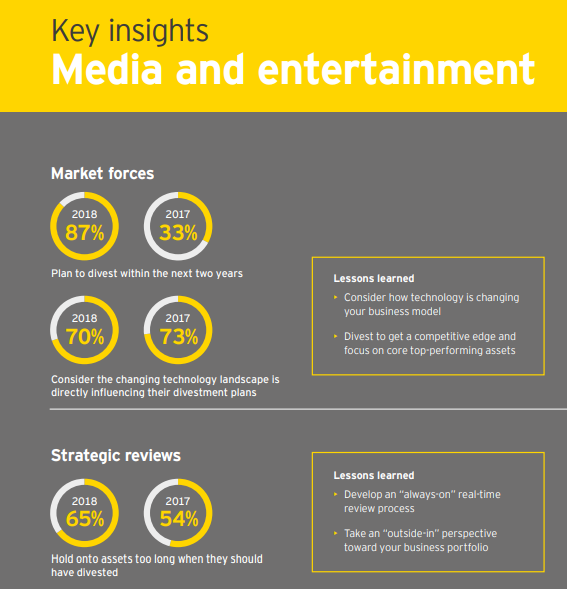 Divest “Now” – to fund digital growth strategies
Divest “Now” – to fund digital growth strategies
· 87% of companies are planning to divest within the next two years
· 70% of executives consider the changing technology landscape is directly influencing their divestment plans
· 65% of companies hold onto assets too long when they should have divested
· 50% stated not presenting the business as a stand-alone business had “scared off” buyers or prompted lower bids
EY Global Media & Entertainment Sector recently published the M&E Global Corporate Divestment Study 2018: How can divesting fuel your future growth? The report is a survey of executives from large M&E companies around the world that gauges plans for approaching divestments, managing portfolio strategy, improving divestment execution and making the remaining business agile.
Media and entertainment sector faces constant change as disruptive forces continue to transform the way in which consumers and businesses interact with and consume content and data. Digital technology is evolving future business models, hence, companies that are agile and fl exible will only be able to thrive. As a result, market leaders realize now is a good time to divest and fund their digital growth strategies. Our latest Global Corporate Divestment Study indicates that a record number (87%) of companies are planning to divest in the next two years — strikingly higher than the 33% reported in our 2017 study.
Media and entertainment companies are confident in the sector growth prospects as well as in their own corporate earnings. Companies are looking to focus on their core areas and as a result are looking to reshape their portfolio. They’re starting to look at divestments and understand what they need to do to drive better value within their control.
In divestment situations, the seller is usually focused on optimizing the following three key components: a) Value; b) Speed; and c) Certainty. Early preparation and focus can help optimize all three components. While most media and entertainment companies (77%) prioritized securing Value over Speed of execution in their most recent divestment, achieving that expected Value can be a signifi cant challenge. Once a formal divestment process has begun; Certainty often becomes the main priority and its impact on Value and Speed can often only be managed appropriately via early preparation and focus.
Sellers should have a clear understanding and agreement on what elements they are willing to compromise to optimize the other; for example by trying to divest in 18 months versus 6 months, may give the seller the opportunity to be better prepared for the sale process and hence will increase value and certainty; but it has come at the expense of speed.
Market forces: technology is evolving business models
Companies are facing intense pressure to evolve their business models using rapidly advancing technology.
As new technologies power innovation, business models in the media and entertainment sector look starkly different than they did just a few years ago. Companies are reorganizing their business models and more than two-third (70%) of executives agree that the changing technology landscape is directly infl uencing their divestment plans. The challenge today’s companies face is deciding what, where and when to divest.
Divest to get a competitive edge
The key divestment driver continues to be a business unit’s relative weakness in competitive position in its marketplace — cited by 90% of companies in the latest findings, up from 57% in 2017. Media and entertainment companies are confi dent of their future growth plans.
Almost half of the companies (47%) planning a divestment say they intend to use the proceeds to fund investment in new technology. Those companies divesting to fund technological change are primarily looking to improve operating effi ciency (75%) and address changing customer needs (80%) in their remaining businesses.
Strategic reviews: develop an “always-on” real-time review process
Especially in this fast-moving market, companies need a portfolio review process that makes them ready to act.
Companies that conduct portfolio reviews at least annually are twice as likely to exceed performance expectations for divesting “at the right time.” However, 65% of media and entertainment companies stated they held on to assets too long. The future of portfolio reviews is a real-time process that captures the exponentially increasing amount of external data and do w-time assessment of performance using advanced analytics.
Take an “outside-in” perspective toward their business portfolio
Almost all media and entertainment companies (98%) struggle to understand how technology impacts the value of their businesses. Furthermore, overcoming emotional attachments to assets and admitting “failure” in one of their business units was highlighted (78%) as a second major challenge in the portfolio review process.

Sellers should avoid this inward focus by taking an outside-in view of their portfolio — understanding shifts in customer expectations, future business models and growth trajectories, as well as competitive positioning. Companies that identify emerging trends are best equipped to readjust their portfolios and recycle capital to take advantage of new growth areas.
Media and entertainment companies are at the forefront of ongoing digital revolution. The companies recognize that changing technology and customers’ expectations demand a different asset mix to thrive in the future. Hence, they must raise their game further and build a sound portfolio strategy to remain in position to disrupt trends.
Hence, they should be aware of the following:
Pace of divestments has sped up and will continue to accelerate
In this fast-moving market, companies should not wait too long to accept that a business may be better off in the hands of another owner.
Strategic and programmed portfolio review process has become an imperative
Businesses need to exploit data and analytics tools to improve decision making and identify non-core assets or lower growth legacy businesses which, can be divested.
Effectively positioning and presenting the business for sale is crucial to extract value
Companies need to spend time up-front to adequately capitalize and operationalize the business for potential buyers. It is important to understand the investment story for the next owner as well as all the opportunities, challenges and restrictions associated with it.

